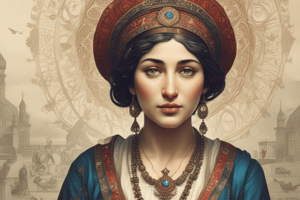Podcast
Questions and Answers
What is the primary purpose of literary fiction?
What is the primary purpose of literary fiction?
- To document historical events in a creative way
- To entertain readers with thrilling plots
- To explore themes common to the human condition (correct)
- To teach moral lessons through allegories
Which type of language in literature aims to establish or imply an idea?
Which type of language in literature aims to establish or imply an idea?
- Ideational language (correct)
- Descriptive language
- Sensuous language
- Emotional language
In the context of epic conventions, what do epithets refer to?
In the context of epic conventions, what do epithets refer to?
- Descriptive phrases for characters (correct)
- Narrative structures
- Symbols of power
- Supernatural elements
What makes the Big Seven or Epic Hero distinctive?
What makes the Big Seven or Epic Hero distinctive?
What is the significance of monomyth in literature?
What is the significance of monomyth in literature?
What distinguishes folk epics from other forms of literature?
What distinguishes folk epics from other forms of literature?
According to Aristotle's Poetics, what is the main aim of literature?
According to Aristotle's Poetics, what is the main aim of literature?
In Greek Tragedy, what does 'Anagnorisis' refer to?
In Greek Tragedy, what does 'Anagnorisis' refer to?
What is the main principle advocated by Edgar Allan Poe in literature?
What is the main principle advocated by Edgar Allan Poe in literature?
Which term refers to the unexpected opposition of the meaning of a story?
Which term refers to the unexpected opposition of the meaning of a story?
What is the key characteristic of a Tragic Hero, as described in the text?
What is the key characteristic of a Tragic Hero, as described in the text?
What is the purpose of 'Catharsis' in literature?
What is the purpose of 'Catharsis' in literature?
Flashcards are hidden until you start studying
Study Notes
Literature
- Literature is a higher art form that liberates and humanizes us.
Types of Literature
- Literary Fiction: explores themes common to the human condition, uses symbolism and literary devices to get into the minds of characters.
- Poetic Language: sensuous, emotional, and ideational.
Imagery
- Primary pigment of poetry.
- Sensation produced by physical perception: visual, olfactory, tactile, gustatory, and auditory.
Epic
- Supernatural, journey, victory, and losses.
- Reflection of culture from the propagation of language, heroic quest, and struggle, divine intervention, and archetypes.
- Monomyth: single cognitive, prelogical (Joseph Campbell).
Epic Convention
- Themes, epithets.
Folk Epic
- Storytelling, passed through oral transmission, language.
The Big Seven/Epic Hero
- Often of noble birth, capable of deeds of great strength and courage, great warriors, travel over a vast setting, national heroism, humility, faces supernatural force, and receives supernatural help.
Theme/Invocation
- Opening statement followed by appeal for supernatural help.
In Medias Res
- In the middle of things, kind of foreshadowing.
Tone/Style
- Reflects the importance of elements, highlights comparison, epithets: short description of an element.
Poetics Aristotle
- Unity of plot, realistic literature aims to represent, literature by nature is imitative/mimetic.
Poetics Plato
- Idealistic, reality is just in the mind, ergo, literature should be censored, there should be one version of reality.
Greek Tragedy
- Imitation of action, linear plot, complete thought but complex plot.
Complex Plot
- Peripeteia (reversal) and Anagnorisis (discovery).
Tragic Hero
- Characteristics: hamartia (flaw), of noble status/birth, sympathy from the audience, gain knowledge.
Levels of Poetic Image
- Sensus, emotional, ideational (Cecil Day Lewis).
Poetic Principle
- Proponent: Edgar Allan Poe, all elements must be aligned to have the single effect or the organic unity of the elements.
Catharsis
- Purgation of soul.
Organic Unity
- Formalist: formal criticism, American New Criticism.
Irony of a Story
- Unexpected opposition of the meaning of a story, ambiguity, tension, paradox, irony.
Studying That Suits You
Use AI to generate personalized quizzes and flashcards to suit your learning preferences.




